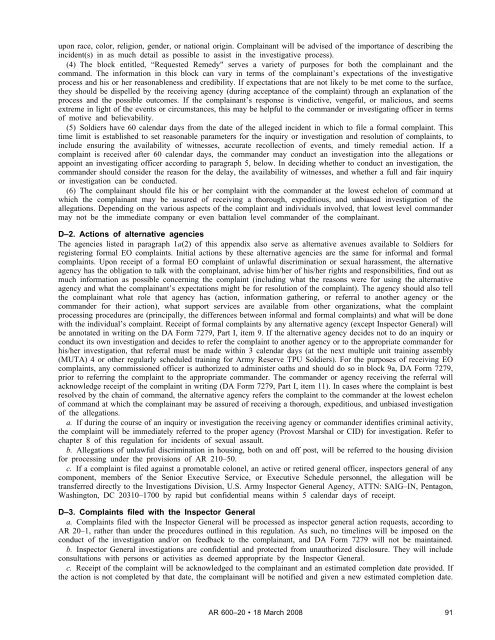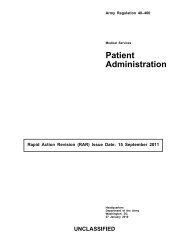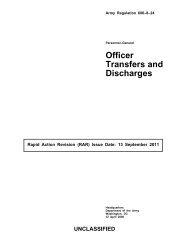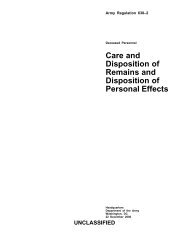AR 600-20, Army Command Policy - Army Publishing Directorate ...
AR 600-20, Army Command Policy - Army Publishing Directorate ...
AR 600-20, Army Command Policy - Army Publishing Directorate ...
You also want an ePaper? Increase the reach of your titles
YUMPU automatically turns print PDFs into web optimized ePapers that Google loves.
upon race, color, religion, gender, or national origin. Complainant will be advised of the importance of describing the<br />
incident(s) in as much detail as possible to assist in the investigative process).<br />
(4) The block entitled, “Requested Remedy" serves a variety of purposes for both the complainant and the<br />
command. The information in this block can vary in terms of the complainant’s expectations of the investigative<br />
process and his or her reasonableness and credibility. If expectations that are not likely to be met come to the surface,<br />
they should be dispelled by the receiving agency (during acceptance of the complaint) through an explanation of the<br />
process and the possible outcomes. If the complainant’s response is vindictive, vengeful, or malicious, and seems<br />
extreme in light of the events or circumstances, this may be helpful to the commander or investigating officer in terms<br />
of motive and believability.<br />
(5) Soldiers have 60 calendar days from the date of the alleged incident in which to file a formal complaint. This<br />
time limit is established to set reasonable parameters for the inquiry or investigation and resolution of complaints, to<br />
include ensuring the availability of witnesses, accurate recollection of events, and timely remedial action. If a<br />
complaint is received after 60 calendar days, the commander may conduct an investigation into the allegations or<br />
appoint an investigating officer according to paragraph 5, below. In deciding whether to conduct an investigation, the<br />
commander should consider the reason for the delay, the availability of witnesses, and whether a full and fair inquiry<br />
or investigation can be conducted.<br />
(6) The complainant should file his or her complaint with the commander at the lowest echelon of command at<br />
which the complainant may be assured of receiving a thorough, expeditious, and unbiased investigation of the<br />
allegations. Depending on the various aspects of the complaint and individuals involved, that lowest level commander<br />
may not be the immediate company or even battalion level commander of the complainant.<br />
D–2. Actions of alternative agencies<br />
The agencies listed in paragraph 1a(2) of this appendix also serve as alternative avenues available to Soldiers for<br />
registering formal EO complaints. Initial actions by these alternative agencies are the same for informal and formal<br />
complaints. Upon receipt of a formal EO complaint of unlawful discrimination or sexual harassment, the alternative<br />
agency has the obligation to talk with the complainant, advise him/her of his/her rights and responsibilities, find out as<br />
much information as possible concerning the complaint (including what the reasons were for using the alternative<br />
agency and what the complainant’s expectations might be for resolution of the complaint). The agency should also tell<br />
the complainant what role that agency has (action, information gathering, or referral to another agency or the<br />
commander for their action), what support services are available from other organizations, what the complaint<br />
processing procedures are (principally, the differences between informal and formal complaints) and what will be done<br />
with the individual’s complaint. Receipt of formal complaints by any alternative agency (except Inspector General) will<br />
be annotated in writing on the DA Form 7279, Part I, item 9. If the alternative agency decides not to do an inquiry or<br />
conduct its own investigation and decides to refer the complaint to another agency or to the appropriate commander for<br />
his/her investigation, that referral must be made within 3 calendar days (at the next multiple unit training assembly<br />
(MUTA) 4 or other regularly scheduled training for <strong>Army</strong> Reserve TPU Soldiers). For the purposes of receiving EO<br />
complaints, any commissioned officer is authorized to administer oaths and should do so in block 9a, DA Form 7279,<br />
prior to referring the complaint to the appropriate commander. The commander or agency receiving the referral will<br />
acknowledge receipt of the complaint in writing (DA Form 7279, Part I, item 11). In cases where the complaint is best<br />
resolved by the chain of command, the alternative agency refers the complaint to the commander at the lowest echelon<br />
of command at which the complainant may be assured of receiving a thorough, expeditious, and unbiased investigation<br />
of the allegations.<br />
a. If during the course of an inquiry or investigation the receiving agency or commander identifies criminal activity,<br />
the complaint will be immediately referred to the proper agency (Provost Marshal or CID) for investigation. Refer to<br />
chapter 8 of this regulation for incidents of sexual assault.<br />
b. Allegations of unlawful discrimination in housing, both on and off post, will be referred to the housing division<br />
for processing under the provisions of <strong>AR</strong> 210–50.<br />
c. If a complaint is filed against a promotable colonel, an active or retired general officer, inspectors general of any<br />
component, members of the Senior Executive Service, or Executive Schedule personnel, the allegation will be<br />
transferred directly to the Investigations Division, U.S. <strong>Army</strong> Inspector General Agency, ATTN: SAIG–IN, Pentagon,<br />
Washington, DC <strong>20</strong>310–1700 by rapid but confidential means within 5 calendar days of receipt.<br />
D–3. Complaints filed with the Inspector General<br />
a. Complaints filed with the Inspector General will be processed as inspector general action requests, according to<br />
<strong>AR</strong> <strong>20</strong>–1, rather than under the procedures outlined in this regulation. As such, no timelines will be imposed on the<br />
conduct of the investigation and/or on feedback to the complainant, and DA Form 7279 will not be maintained.<br />
b. Inspector General investigations are confidential and protected from unauthorized disclosure. They will include<br />
consultations with persons or activities as deemed appropriate by the Inspector General.<br />
c. Receipt of the complaint will be acknowledged to the complainant and an estimated completion date provided. If<br />
the action is not completed by that date, the complainant will be notified and given a new estimated completion date.<br />
<strong>AR</strong> <strong>600</strong>–<strong>20</strong> 18 March <strong>20</strong>08<br />
91
















